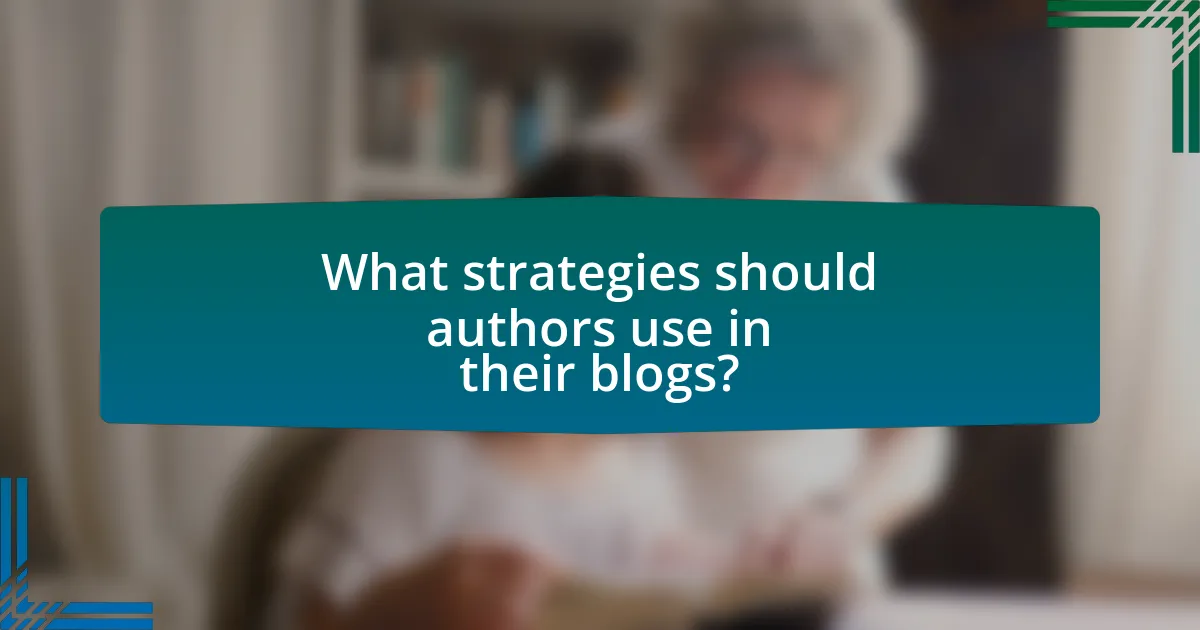Blogging is a vital marketing tool for authors, enhancing their visibility, establishing authority, and fostering reader engagement. Regular blog posts allow authors to showcase their expertise, optimize content for search engines, and connect with their audience, ultimately driving traffic to their portfolios. The article explores how blogging can improve an author’s online presence, the role of SEO in increasing discoverability, and strategies for maintaining a consistent blogging schedule. It also discusses the importance of audience engagement, content variety, and measuring success through key performance indicators, providing authors with actionable insights to effectively market their work.

What is Blogging as a Marketing Tool for Your Author Portfolio?
Blogging serves as a powerful marketing tool for an author portfolio by enhancing visibility, establishing authority, and engaging with readers. Through regular blog posts, authors can showcase their expertise, share insights about their writing process, and connect with their audience, which fosters a loyal readership. According to a study by HubSpot, companies that blog receive 97% more links to their websites, indicating that blogging significantly boosts online presence. Additionally, blogging allows authors to optimize their content for search engines, increasing discoverability and driving traffic to their portfolio. This combination of visibility, authority, and engagement makes blogging an essential strategy for authors looking to market their work effectively.
How can blogging enhance an author’s visibility?
Blogging enhances an author’s visibility by providing a platform for consistent content creation that attracts and engages readers. Regularly publishing blog posts allows authors to showcase their expertise, share insights related to their writing, and connect with their audience, which can lead to increased traffic to their main works. According to a study by HubSpot, companies that blog receive 97% more links to their websites, indicating that blogging can significantly improve online presence and search engine rankings. This increased visibility can result in a broader readership and potential sales for the author’s books.
What role does SEO play in author blogging?
SEO plays a crucial role in author blogging by enhancing visibility and driving organic traffic to an author’s website. By optimizing blog content with relevant keywords, authors can improve their search engine rankings, making it easier for potential readers to discover their work. For instance, a study by HubSpot found that 75% of users never scroll past the first page of search results, highlighting the importance of SEO in reaching a wider audience. Additionally, effective SEO strategies, such as using meta tags and optimizing images, can further increase engagement and conversion rates, ultimately supporting an author’s marketing efforts.
How does consistent blogging build an author’s brand?
Consistent blogging builds an author’s brand by establishing authority and fostering a loyal readership. When authors regularly publish content, they demonstrate expertise in their subject matter, which enhances their credibility. For instance, a study by HubSpot found that companies that blog receive 97% more links to their websites, indicating increased visibility and engagement. This visibility helps authors connect with their target audience, creating a community around their work. Additionally, consistent blogging allows authors to showcase their unique voice and style, further differentiating them in a crowded market.
Why is blogging important for authors?
Blogging is important for authors because it enhances their visibility and engagement with readers. By regularly publishing content, authors can showcase their expertise, share insights about their writing process, and connect with their audience on a personal level. This interaction fosters a loyal readership, which is crucial for book sales and overall career growth. Additionally, blogging improves search engine optimization (SEO), making it easier for potential readers to discover an author’s work online. According to a study by HubSpot, companies that blog receive 97% more links to their websites, demonstrating the effectiveness of blogging in driving traffic and increasing online presence.
What unique advantages does blogging offer compared to other marketing strategies?
Blogging offers unique advantages such as enhanced audience engagement, improved SEO, and the establishment of authority in a niche. Unlike other marketing strategies, blogging allows for in-depth content that fosters a connection with readers, encouraging interaction through comments and shares. Additionally, consistent blogging can significantly boost search engine rankings; according to HubSpot, companies that blog receive 97% more links to their websites. Furthermore, by providing valuable insights and expertise, bloggers can position themselves as thought leaders, which builds trust and credibility among their target audience.
How can blogging foster a connection with readers?
Blogging fosters a connection with readers by providing a platform for authentic communication and engagement. Through regular posts, authors can share personal insights, experiences, and expertise, which helps to humanize their brand and create relatability. Research indicates that 77% of internet users read blogs, highlighting the medium’s effectiveness in reaching and engaging audiences. Additionally, interactive elements such as comments and social media sharing allow readers to participate in discussions, further strengthening the bond between the author and their audience. This two-way communication fosters loyalty and encourages readers to return for more content.

What strategies should authors use in their blogs?
Authors should use content marketing strategies, SEO optimization, and audience engagement techniques in their blogs. Content marketing involves creating valuable, relevant content that attracts and retains a clearly defined audience, which can enhance an author’s visibility and credibility. SEO optimization ensures that blog posts rank higher in search engine results, increasing organic traffic; for instance, using targeted keywords can improve search rankings significantly. Audience engagement techniques, such as responding to comments and encouraging discussions, foster a community around the blog, leading to increased loyalty and readership. These strategies collectively enhance an author’s online presence and promote their portfolio effectively.
How can authors choose relevant topics for their blogs?
Authors can choose relevant topics for their blogs by identifying their target audience’s interests and aligning them with their expertise. This approach ensures that the content resonates with readers while showcasing the author’s knowledge. Research indicates that 60% of consumers prefer to read content that addresses their specific needs and interests, highlighting the importance of audience alignment. Additionally, authors can utilize tools like Google Trends and social media analytics to discover trending topics within their niche, further enhancing the relevance of their blog content.
What methods can authors use to identify their target audience’s interests?
Authors can identify their target audience’s interests through methods such as conducting surveys, analyzing social media engagement, and utilizing keyword research tools. Surveys allow authors to gather direct feedback from readers about their preferences and interests, providing valuable insights. Analyzing social media engagement helps authors understand which topics resonate most with their audience by examining likes, shares, and comments on posts. Additionally, keyword research tools reveal what potential readers are searching for online, indicating their interests and needs. These methods collectively enable authors to tailor their content effectively to meet audience expectations.
How can trending topics be integrated into an author’s blog content?
Trending topics can be integrated into an author’s blog content by aligning blog posts with current events, popular culture, or viral discussions relevant to the author’s genre or audience. This approach not only attracts more readers but also enhances engagement by tapping into what is currently capturing public interest. For instance, if a new book adaptation is trending, an author could write a post analyzing its themes or comparing it to their own work. Research shows that content related to trending topics can increase web traffic by up to 50%, as readers are more likely to share and engage with timely and relevant content.
What types of content should authors include in their blogs?
Authors should include a variety of content types in their blogs to effectively engage their audience and promote their work. This content can include book excerpts, writing tips, personal anecdotes, industry news, and guest posts from other authors. For instance, sharing book excerpts allows readers to preview the author’s writing style, while writing tips can establish the author as an expert in their field. Personal anecdotes create a connection with readers, making the author more relatable. Industry news keeps the audience informed about trends and developments, and guest posts can introduce new perspectives and broaden the blog’s reach. These diverse content types not only attract a wider audience but also enhance the author’s credibility and visibility in the literary community.
How can authors effectively share their writing process through blogging?
Authors can effectively share their writing process through blogging by providing detailed insights into their creative journey, including drafts, revisions, and the challenges they face. This transparency fosters a connection with readers, as they gain a deeper understanding of the author’s work and the effort involved. For instance, sharing specific examples of how a character developed or how a plot twist was conceived can engage readers and encourage them to follow the author’s progress. Additionally, incorporating multimedia elements like images or videos of the writing environment can enhance the storytelling aspect of the blog. By consistently updating their blog with authentic content, authors can build a loyal audience that appreciates their dedication and creativity.
What are the benefits of including personal stories in blog posts?
Including personal stories in blog posts enhances reader engagement and builds a connection with the audience. Personal narratives create relatability, allowing readers to see themselves in the author’s experiences, which fosters trust and loyalty. Research indicates that storytelling can increase information retention by up to 65%, making the content more memorable. Furthermore, personal stories can differentiate an author’s voice, making their blog stand out in a crowded market, thereby attracting a more dedicated readership.

How can authors measure the success of their blogging efforts?
Authors can measure the success of their blogging efforts through key performance indicators (KPIs) such as traffic, engagement, and conversion rates. Traffic can be assessed using analytics tools like Google Analytics, which provide data on the number of visitors, page views, and unique visitors to the blog. Engagement metrics, including comments, shares, and time spent on the page, indicate how well the content resonates with readers. Conversion rates, which track actions such as newsletter sign-ups or book purchases resulting from blog visits, provide insight into the effectiveness of the blog in driving desired outcomes. According to a HubSpot report, businesses that prioritize blogging are 13 times more likely to achieve a positive ROI, highlighting the importance of these metrics in evaluating blogging success.
What metrics should authors track to evaluate their blog’s performance?
Authors should track metrics such as page views, unique visitors, bounce rate, average time on page, and social shares to evaluate their blog’s performance. Page views indicate the total number of times a blog post has been viewed, while unique visitors measure the number of distinct individuals visiting the blog, providing insight into reach. Bounce rate reflects the percentage of visitors who leave after viewing only one page, which can signal content relevance or engagement issues. Average time on page reveals how long readers stay engaged with the content, and social shares indicate how often posts are shared across social media platforms, reflecting audience interest and engagement. Tracking these metrics allows authors to assess their blog’s effectiveness in attracting and retaining readers, ultimately aiding in their marketing strategy.
How can engagement metrics inform future blogging strategies?
Engagement metrics can inform future blogging strategies by providing insights into reader preferences and content effectiveness. Analyzing metrics such as page views, time spent on page, and social shares allows authors to identify which topics resonate most with their audience. For instance, a study by HubSpot found that blogs with higher engagement rates often lead to increased lead generation, indicating that understanding these metrics can directly influence content planning and marketing efforts. By leveraging this data, authors can tailor their content to better meet audience interests, ultimately enhancing their author portfolio’s visibility and impact.
What tools can authors use to analyze their blog traffic?
Authors can use tools like Google Analytics, SEMrush, and Ahrefs to analyze their blog traffic. Google Analytics provides detailed insights into visitor behavior, traffic sources, and demographics, allowing authors to understand their audience better. SEMrush offers traffic analysis, keyword tracking, and competitive research, helping authors optimize their content strategy. Ahrefs focuses on backlink analysis and organic search traffic, enabling authors to improve their blog’s visibility. These tools are widely recognized in the industry for their effectiveness in providing actionable data on blog performance.
What are common challenges authors face when blogging?
Authors commonly face challenges such as maintaining consistent content creation, engaging their audience, and managing time effectively when blogging. Consistent content creation is crucial for building an audience, yet many authors struggle to produce regular posts due to competing writing commitments or lack of inspiration. Engaging the audience is another significant challenge; authors must not only attract readers but also retain their interest through compelling writing and interaction. Time management is also a critical issue, as authors often juggle multiple responsibilities, making it difficult to dedicate sufficient time to blogging. According to a survey by the Content Marketing Institute, 60% of marketers cite producing engaging content as their biggest challenge, which reflects the difficulties authors face in the blogging landscape.
How can authors overcome writer’s block in their blogging efforts?
Authors can overcome writer’s block in their blogging efforts by implementing structured writing routines and engaging in brainstorming techniques. Establishing a consistent writing schedule helps create a habit, making it easier to produce content regularly. Techniques such as free writing, where authors write continuously for a set period without worrying about grammar or structure, can stimulate creativity and generate ideas. Additionally, utilizing prompts or themes related to their genre can provide direction and focus, reducing the pressure to create original content from scratch. Research indicates that structured routines and creative exercises can significantly enhance productivity and reduce instances of writer’s block, as they encourage a flow of ideas and diminish self-doubt.
What strategies can help authors maintain a consistent blogging schedule?
Authors can maintain a consistent blogging schedule by implementing a content calendar, setting specific writing goals, and utilizing automation tools. A content calendar helps authors plan and organize their posts in advance, ensuring a steady flow of content. Setting specific writing goals, such as dedicating a certain number of hours per week to writing, creates accountability and structure. Automation tools, like scheduling software, allow authors to publish posts at predetermined times, even when they are busy. These strategies are effective as they provide a clear framework for content creation and management, leading to increased consistency in blogging.
What best practices should authors follow for effective blogging?
Authors should follow several best practices for effective blogging, including creating high-quality, engaging content, optimizing for SEO, maintaining a consistent posting schedule, and promoting their posts through social media. High-quality content attracts readers and encourages sharing, while SEO optimization increases visibility in search engines, making it easier for potential readers to find the blog. A consistent posting schedule helps build an audience by setting expectations for new content, and promoting posts on social media platforms can drive traffic and enhance engagement. According to a HubSpot report, companies that blog receive 97% more links to their websites, demonstrating the effectiveness of these practices in increasing online presence and audience reach.
How can authors optimize their blog posts for search engines?
Authors can optimize their blog posts for search engines by implementing effective SEO strategies. This includes conducting keyword research to identify relevant terms that potential readers are searching for, and then strategically incorporating these keywords into the blog post’s title, headings, and throughout the content. Additionally, authors should ensure that their posts are well-structured with clear headings and subheadings, which not only improves readability but also helps search engines understand the content better.
Furthermore, optimizing meta descriptions and using alt text for images can enhance visibility in search results. According to a study by HubSpot, 75% of users never scroll past the first page of search results, highlighting the importance of ranking well. Authors should also focus on creating high-quality, engaging content that encourages readers to spend more time on the page, as dwell time is a factor in search engine rankings. Lastly, building backlinks from reputable sites can significantly improve a blog’s authority and search engine performance.
What tips can enhance the readability and engagement of blog content?
To enhance the readability and engagement of blog content, authors should utilize clear headings, concise paragraphs, and bullet points. Clear headings guide readers through the content, making it easier to scan and locate information. Concise paragraphs, ideally 2-4 sentences long, prevent overwhelming the reader and maintain their attention. Bullet points break down complex information into digestible pieces, improving comprehension. Research indicates that articles with headings and bullet points can increase engagement by up to 80%, as they cater to the skimming behavior of online readers.



